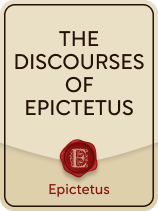

This article is an excerpt from the Shortform book guide to "The Discourses of Epictetus" by Epictetus. Shortform has the world's best summaries and analyses of books you should be reading.
Like this article? Sign up for a free trial here.
When someone insults you, how should you respond? Should you be proud of your family?
Epictetus and other Stoic philosophers had an opinion about things outside of yourself. They believed that those things aren’t important. So, external things shouldn’t cause you pain, pride, or any number of reactions you might be tempted to have.
Keep reading to understand Epictetus’ view of external things and see how it might give you peace of mind.
External Things Don’t Matter
To illustrate why your mind is the only thing that matters, Epictetus explains why other things don’t matter.
First, Epictetus claims that nothing outside of yourself can harm you or upset you—rather, the way you interpret and respond to external things is what harms you. For example, if someone insults you, those words won’t cause you any harm, but allowing yourself to get upset or angry over the insult would harm you. Similarly, if you suffer an injury or an illness, that only affects your physical body. The things that are truly you—your thoughts and feelings—aren’t affected unless you allow them to be.
(Shortform note: In Meditations, Marcus Aurelius makes a very similar claim, with one small change—he says the only thing that can harm you is something that hinders your ability to act according to Nature (which he calls “following logos”). For example, he agrees with Epictetus that a purely physical disease like the flu doesn’t harm you—however, something that affects your mind such as Alzheimer’s disease would truly harm you, because an inability to think clearly would prevent you from acting according to Nature.)
Just as things outside of yourself can’t harm you, they also shouldn’t inspire pride. For example, it’s meaningless to congratulate yourself for having a large house, an important job, or a loving family—those good qualities belong to external things, not to you, so they don’t make you inherently better than anyone else. The only thing worth being proud of is your reason: your ability to understand the world around you and respond appropriately to it, in accordance with Nature.
Note that Epictetus is only warning against undue pride. You can still appreciate and enjoy all of these things—just don’t let them feed your pride.
(Shortform note: In Ego Is the Enemy, Ryan Holiday says that pride is a distortion of reality. It’s your ego lying to you about how well you’re doing—for example, by telling you that you’re better than other people because you have a larger house than them. Holiday says that it’s important to recognize and control your pride because your distorted perceptions will hurt your ability to understand your current situation and respond appropriately to it. In other words, your belief that you’re successful will get in the way of your actual success in life. For example, a corporate executive might get an inflated idea of his business acumen and start making hasty, ill-advised business decisions because he doesn’t seek out other people’s advice first.)
Finally, always try to see things for what they are, and don’t value them more than they’re worth. For example, maybe you have a painting that you’re especially fond of. If you recognize that it’s just a painting—a collection of pigments on a piece of canvas—you won’t be upset if it gets damaged or lost.
(Shortform note: Marcus Aurelius (Meditations) elaborates on this idea of seeing things for what they are so you don’t overvalue them. Aurelius says that, when you examine something, there’s no need to look beyond your first impression of it. For example, when you see a painting on your wall, there’s no need to think of it as anything other than a painting—don’t start thinking about how it’s your painting, or worrying that something might happen to it. Simply accept what it is, at face value.)

———End of Preview———
Like what you just read? Read the rest of the world's best book summary and analysis of Epictetus's "The Discourses of Epictetus" at Shortform.
Here's what you'll find in our full The Discourses of Epictetus summary:
- Why you need to understand the laws of nature to be happy
- Stoic strategies for remaining calm in the face of adversity
- Epictetus's specific rules for living well






